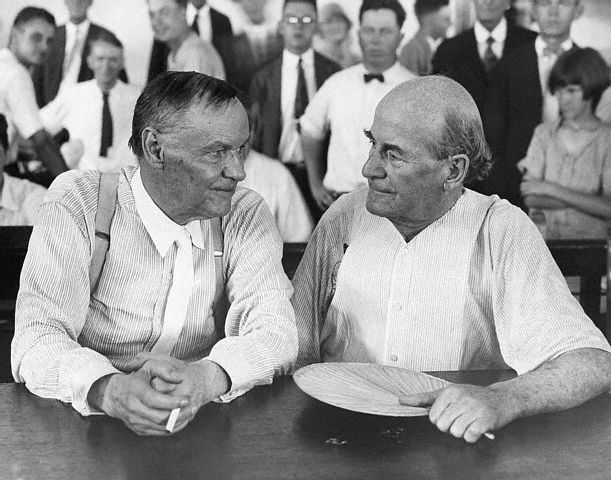
Clarence Darrow and William Jennings Bryan
The so-called “Scopes Monkey Trial” began July 10, 1925 in Dayton, Tennessee, when high school biology teacher John T. Scopes (1900-70), faced court proceedings on the charge of having taught evolution in violation of the Butler Act. The trial was originally conceived as a publicity stunt in promote business in Dayton, and it truly became a media circus, with reporters from all over the world sending reports back home. One of Scopes’ lawyers was the famous agnostic and criminal defense attorney Clarence Darrow and one of the prosecuting attorneys was the famous populist and fundamentalist William Jennings Bryan.
The following is a quote of the judge’s instructions to the jury:
Gentlemen of the grand jury, on May 25, 1925, John T. Scopes was indicted in this county for violating what is generally known as the anti-evolution statute. There is some uncertainty as to whether or not this indictment is valid, and, in order to avoid a possibility of it being invalid. I have determined to convene this grand jury for the purpose of reinvestigating these charges, I now use substantially the same charge I gave the first grand jury.
The statute, which it is alleged the said Scopes violated, is Chapter 27 of the acts of 1925, which makes it unlawful to teach in the universities, normals and all other public schools of the state, which are supported in whole or in part by the public school funds of the state, any theory that denies the story of Divine creation of man as taught in the Bible and teach instead theory that man descended from a lower order of animals. This act became the law in Tennessee on March 21, 1925.
The defense did not argue that Scopes was innocent of technically violating the law – instead, they argued that evolution was valid, that it was compatible with certain interpretations of the Bible, and hence that the original law itself was wrong. The court refused to rule in such matters and instead stuck strictly to whether or not the law was violated – and so found Scopes guilty, fining him $100. The state supreme court later reversed this judgment, but Scopes and the trial were already famous around the country.
Although Scopes technically lost the case, many perceive it as a victory for evolutionists and rationalism. It put a spotlight on the beliefs of fundamentalists, holding them up to public ridicule – and indeed, there was widespread rejection of their anti-science stance. It also opened the door to wider dissemination of the ideas behind evolution, leading more people to give it serious consideration. In the end, however, the prejudice against teaching evolution in public schools remained in force through much of the country until the Cold War, when the United States saw the launch of the Sputnik artificial satellite as a sign that the Soviet Union was gaining scientific superiority.


